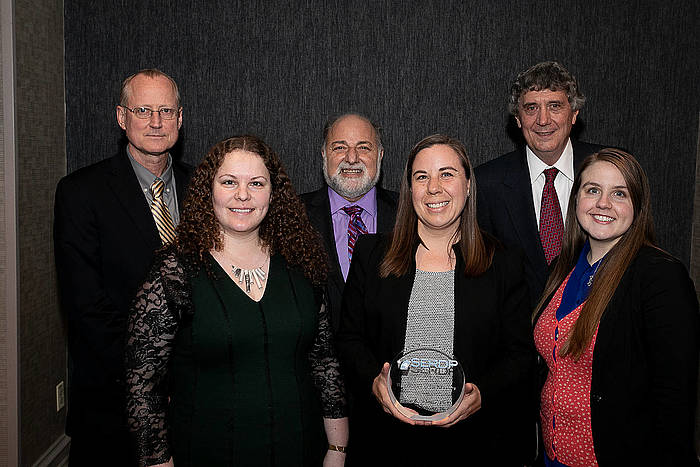
An NDSU professor and two NDSU alumni are part of a team recognized with a 2019 Project of the Year Award by the Department of Defense’s Strategic Environmental Research and Development Program and the Environmental Security Technology Certification Program. The award was announced at the programs’ symposium in Washington, D.C., Dec. 3-5.
Stuart Croll, NDSU professor of coatings and polymeric materials, and NDSU alumni Aaron Feickert, PhD ’18, physics, and Mary Hedrick, BS ’16, chemistry, participated in the “Standardized Test Methodologies for Specialty Coating Durability” research project.
The work was the Project of the Year selection in the Weapons Systems and Platforms area.
The team, led by Karen Schultz of Boeing, developed a new test method for coatings that combines the effects of dynamic mechanical strain and relevant environmental stressors of temperature and humidity. The test produces coating cracking with features similar to what is observed on structures. The researchers say replacing exterior coatings can generate environmentally hazardous materials, such as the removed coating, solvents and other waste generated during the removal process. Because of that, understanding degradation and failure in multi-layer coating systems is critically important.
The new test methodologies offer a better way to predict the performance of current and future coating systems, and improve the Department of Defense’s capability to select more durable coating components and systems.
Other members of the team include: Lindsey Blohm, Boeing; Christina Grumbach, Boeing; David Jackson, Boeing; Sean Pennell, Boeing; Thai Sweitzer, Boeing; Gary Vanbooven, Boeing; Kristen Williams, Boeing; Bruno Zamorano Senderos, Boeing; Fritz Friedersdorf, Luna Innovations; Brandi Clark, Luna Innovations; Patrick Kramer, Luna Innovations; Alen Fletcher, U.S. Air Force Research Laboratory; and Kevin Miller, Naval Air System Command.
The Project of the Year awards recognize scientific advances and technological solutions to some of the Department of Defense’s most significant environmental and installation energy challenges.
As a student-focused, land grant, research university, we serve our citizens.




